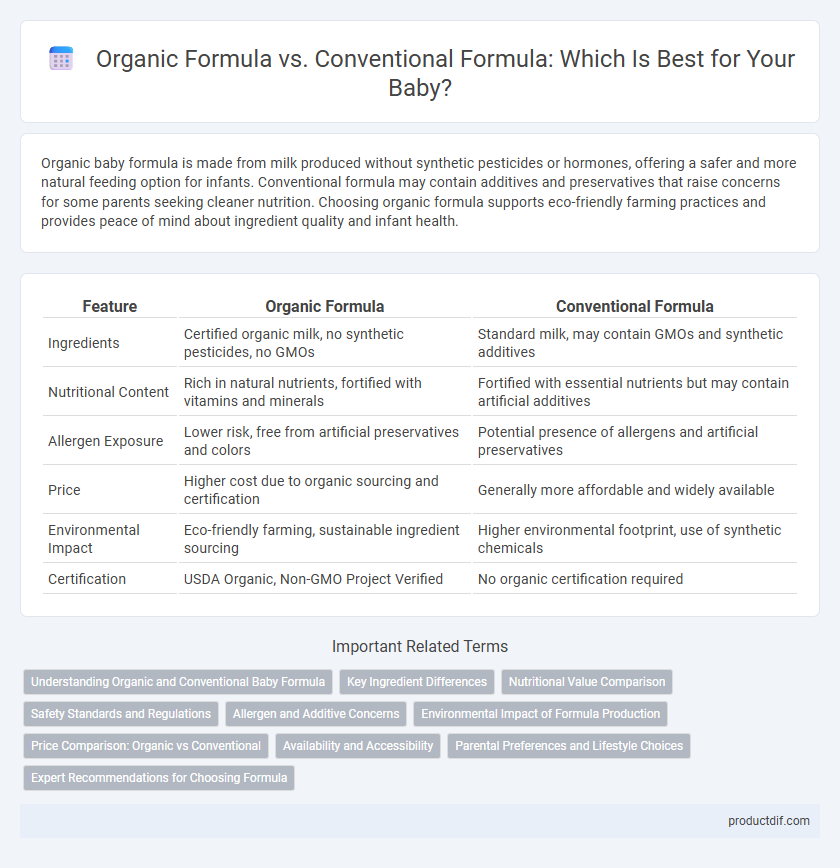Organic baby formula is made from milk produced without synthetic pesticides or hormones, offering a safer and more natural feeding option for infants. Conventional formula may contain additives and preservatives that raise concerns for some parents seeking cleaner nutrition. Choosing organic formula supports eco-friendly farming practices and provides peace of mind about ingredient quality and infant health.
Table of Comparison
| Feature | Organic Formula | Conventional Formula |
|---|---|---|
| Ingredients | Certified organic milk, no synthetic pesticides, no GMOs | Standard milk, may contain GMOs and synthetic additives |
| Nutritional Content | Rich in natural nutrients, fortified with vitamins and minerals | Fortified with essential nutrients but may contain artificial additives |
| Allergen Exposure | Lower risk, free from artificial preservatives and colors | Potential presence of allergens and artificial preservatives |
| Price | Higher cost due to organic sourcing and certification | Generally more affordable and widely available |
| Environmental Impact | Eco-friendly farming, sustainable ingredient sourcing | Higher environmental footprint, use of synthetic chemicals |
| Certification | USDA Organic, Non-GMO Project Verified | No organic certification required |
Understanding Organic and Conventional Baby Formula
Organic baby formula is made from ingredients grown without synthetic pesticides, fertilizers, or genetically modified organisms, ensuring fewer chemical residues and potentially reducing allergen exposure. Conventional formula often contains dairy, soy, or corn derivatives produced using conventional farming methods, which may involve pesticide residues and additives. Understanding the differences helps parents select a formula that aligns with their health preferences and nutritional requirements for their infant.
Key Ingredient Differences
Organic baby formula contains ingredients sourced from certified organic farms, free from synthetic pesticides, hormones, and antibiotics, ensuring a natural and safer option for infant nutrition. Conventional formula typically includes ingredients that may be derived from crops treated with pesticides and may use additives or preservatives not permitted in organic products. The key ingredient differences revolve around the purity and sourcing standards, with organic formulas emphasizing non-GMO, chemical-free components to support sensitive baby digestive systems and reduce exposure to potential toxins.
Nutritional Value Comparison
Organic baby formula typically contains fewer synthetic pesticides and artificial additives, ensuring a purer nutritional profile for infants. Conventional formula often utilizes fortified ingredients to meet standard nutritional requirements but may include trace amounts of GMOs or preservatives. Both types meet essential nutrient needs such as DHA, ARA, vitamins, and minerals, with organic formulas emphasizing natural sourcing and minimal chemical exposure.
Safety Standards and Regulations
Organic baby formula undergoes rigorous safety standards, including certification by USDA Organic and adherence to strict pesticide and synthetic additive limits. Conventional formula is regulated by the FDA, requiring compliance with nutrient, contaminant, and manufacturing quality standards to ensure infant health. Both types must meet stringent safety regulations, but organic formulas often exceed minimum requirements by emphasizing natural ingredient sourcing and reduced exposure to synthetic chemicals.
Allergen and Additive Concerns
Organic baby formula contains fewer synthetic additives and is less likely to include common allergens such as artificial preservatives, colors, and flavors found in conventional formulas. Conventional formulas often have additives like corn syrup solids and modified starches, which may trigger allergies or digestive issues in sensitive infants. Choosing organic formula can reduce exposure to potential allergens and harmful chemicals, supporting better infant health and comfort.
Environmental Impact of Formula Production
Organic formula production significantly reduces environmental impact by utilizing sustainably sourced ingredients and avoiding synthetic pesticides or fertilizers, which minimizes soil and water contamination. Conventional formula often relies on intensive farming practices that contribute to higher carbon emissions and greater resource depletion. Choosing organic formula supports eco-friendly agriculture and reduces the overall carbon footprint associated with infant nutrition.
Price Comparison: Organic vs Conventional
Organic baby formula typically costs 20-50% more than conventional formula due to higher-quality ingredients and stricter production standards. Conventional formula benefits from mass production and cost efficiencies, resulting in lower retail prices. Parents often weigh the higher expense of organic options against perceived health benefits when making purchasing decisions.
Availability and Accessibility
Organic baby formula is increasingly available in specialty health stores and online, though it often comes at a higher price point compared to conventional formula. Conventional baby formula remains widely accessible in supermarkets, drugstores, and general retailers, offering a broader range of options and price points. Parents seeking organic options may encounter limited stock in rural or low-income areas, whereas conventional formula benefits from extensive distribution networks ensuring greater accessibility.
Parental Preferences and Lifestyle Choices
Parents increasingly opt for organic formula due to concerns about synthetic pesticides, GMOs, and added hormones commonly found in conventional formula. Organic formula supports a lifestyle emphasizing natural and sustainable choices, appealing to health-conscious families prioritizing clean nutrition. Convenience and cost remain factors influencing some parents to choose conventional formula despite growing awareness of organic alternatives.
Expert Recommendations for Choosing Formula
Pediatricians emphasize choosing organic formula for infants with sensitivities to pesticides and synthetic ingredients, highlighting its reduced exposure to harmful chemicals. Conventional formula remains widely recommended for infants without allergies due to its stringent nutritional standards and affordability. Experts advise parents to consult healthcare providers to select formula based on individual baby health needs and nutritional requirements.
Organic formula vs Conventional formula Infographic

 productdif.com
productdif.com